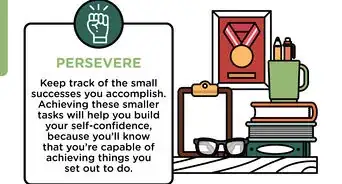This article was co-authored by Annie Lin, MBA. Annie Lin is the founder of New York Life Coaching, a life and career coaching service based in Manhattan. Her holistic approach, combining elements from both Eastern and Western wisdom traditions, has made her a highly sought-after personal coach. Annie’s work has been featured in Elle Magazine, NBC News, New York Magazine, and BBC World News. She holds an MBA degree from Oxford Brookes University. Annie is also the founder of the New York Life Coaching Institute which offers a comprehensive life coach certification program. Learn more: https://newyorklifecoaching.com
There are 15 references cited in this article, which can be found at the bottom of the page.
This article has been viewed 54,598 times.
If you've ever had to struggle to achieve a significant goal without the support of others, you know how difficult it can be. Whether it's quitting smoking, losing weight, saving money, or finding a new job, striving for a goal can be overwhelming on your own. The good news is, it doesn't have to be that way. You can provide the support that can make the difference between success and failure for someone striving to achieve a goal. It can be a friend, a co-worker, or someone you've just met through an online support community. Regardless, your help can promote the realization of another person's dream.
Steps
Helping with Goal Setting
-
1Discuss values. If someone you know is looking to improve his/her life, but doesn't have a clear goal in mind yet, you can help with goal setting. A good place to start is to have a discussion with this person about his or her values and aspirations.
- Make it your business to find out what is important to this person.[1] Find out what he/she values most and would like to achieve in life.[2]
- Ask questions that will lead this person to think about what is most important to her or him. For example: "How important is financial success to you?" "What types of activities do you most enjoy doing?" "What would your ideal career be?" or "What would you most like to improve about yourself?"
- Through this process, you help this person think about what it is he/she wants from life. This is the first step in setting goals.[3]
-
2Encourage the person to be as specific as possible. Once the person you are helping has some idea what he/she wants, the next thing you can do is help make the goal specific. Specific goals are more motivating and effective than vague ones.[4]
- Getting specific is largely a matter of defining terms.[5] For example, maybe the person you are helping has expressed a desire to be healthier. Encourage him or her to define what that means as specifically as possible. Does it mean losing weight? Eating better? Getting medical attention for chronic health issues?
- At this stage, it is important for the goal setter to define, as clearly as possible, what it is she or he wants to do. This should be spelled out in such a way that it will be clear when the person has reached his or her goal.[6] Help her or him by again asking questions.
- For example, you could ask: "What does that mean to you?" "What sorts of things would you need to do to achieve that?" and "How would you know when you had reached your goal?"
- Here some examples of vague goals: "get healthy," "go to college," and "get a new job."
- Here are some examples of clear goals: "lose 40 pounds," "get a bachelors degree in philosophy," and "get a full-time job in the field of graphic design."
Advertisement -
3Assess whether the goal is achievable. Sometimes, people want things in life that are beyond their reach. As an outsider, you may have a better sense of whether the goals being set are realistic. If not, you should encourage the goal-setter to give this question some thought.
- Setting goals that can't be reached just sets people up for failure and disappointment. It can discourage them from trying to achieve other goals in the future.[7]
- For example, imagine you know someone who wants to become a professional basketball player. If this person is only 5 feet tall, this is probably not an achievable goal.
- No one wants to tell someone he/she is going to fail. Again, a good way to approach this is through asking questions. For example, you might ask: "What obstacles do you think might prevent you from achieving this?" or "Do you think that is a realistic goal?"
- Help the person test the reality of the goal by encouraging research. How does her/his background and experience compare to professional basketball players? How does she/he compare to others on the current team? Would playing basketball on the varsity team in high school or maybe making a college team be a better goal?
-
4Encourage prioritizing the goals. Lots of people have many goals in life. But, trying to pursue all of them at once can prevent someone from making much headway on any of them. Encourage the goal setter to think about which goals are most important and pursue those first.
- Encourage the goal-setter to consider her/his level of commitment to each goal.[8] If he or she isn't very committed to a goal that is going to be very difficult to achieve, this should be moved down the priority list.
- Once again, a good way to do this is to ask questions. For instance, you might ask: "How important is that goal to you?" or "Of those two goals, which is the more important?" or "That's going to take a lot of hard work. Are you ready to put in the time and effort?"
-
5Participate in writing a plan. Large goals are more easily achieved if they can be broken down into smaller steps or sub-goals. The goal-setter can use these steps to write up a plan for achieving his/her goal.[9] You can assist by helping brainstorm the steps that would be necessary to achieve it.
- Again, asking questions is a good way to encourage the goal setter to think in these terms. You might ask: "What steps will you need to take to make that happen?" or "What sorts of resources/qualifications will you need in order to do that?"
- Effective plans for reaching goals often involve a timeline and deadlines. These help the goal setter stay accountable and add a sense of urgency about achieving each step. Encourage the goal-setter to come up with some sensible deadlines. Ask how long he or she expects the various steps of the plan to take, and let him or her know you'll be checking in to see how things are progressing.
-
6Brainstorm about obstacles. In striving to reach any goal, there will be obstacles that will make it harder to achieve. Some of these will be predictable, others will not. Help the goal-setter think about things that might make the goal harder to reach.
- Thinking about obstacles in advance gives the goal setter (and you) a chance to think about ways to overcome her or him.[10]
- Here, you might ask the goal-setter questions like: "What can you imagine standing in the way of achieving that goal?" or "Have you considered the possibility that [some challenging situation] might happen? What might you do about that?"
Helping with Goal Achievement
-
1Promote a positive environment. To the extent that you are able, help create a positive environment for the person to work on his/her goals. Help remove distractions and other obstacles.
- This is easy if the person is someone you live with like a spouse, family member, or roommate. You can help be removing distractions and temptations from your home. For example, if a family member who is trying to quit smoking always smokes in a chair on the porch, remove the chair.[11]
- Even if you don't live with the person who is striving for a goal, you may still be able to help. For example, if the person is a coworker, you can try to remove distractions at work. For instance, you might be able to take on an extra task to free them to focus more on their personal goals.
-
2Offer encouragement. Motivation and perseverance are crucial to achieving difficult goals.[12] You can help boost someone's motivation by offering encouraging words.
- Especially if it seems that this person may be giving up or feeling uninspired, your words of encouragement can help promote goal achievement.
- You can saying things like: "You can do it," or "I believe in you." Or, better yet, remind her or him of the progress she/he has already made.
-
3Check in on progress. One of the most important services you can provide to someone striving for a goal is to provide greater accountability. You can do this by checking in regularly to see if the person is sticking to the plan he/she set.[13]
- You don't want to nag the person, but you do want to add some extra motivation to complete subgoals on schedule. This can be a difficult balance to strike.
- It's a good idea to let the person know in advance that you want to help by checking in. If the person says she/he would prefer that you don't, then don't. Likewise, if the person tells you to stop asking about it, don't force the issue. You want to be helpful, but not invasive. You can even ask if there is another way she/he would like you to help, but if not, accept this choice.
- If the person does want you to help her/him stay on track, make note of the deadlines he/she has set. When a deadline is drawing near, ask how things are going.
-
4Address setbacks and challenges. If the person striving for a goal has setback, falls behind, or fails to reach a sub-goal on schedule, do what you can to help.
- This might mean helping brainstorm ways around a particular obstacle. It might mean helping remove that obstacle yourself. Or, it might just mean giving a pep-talk to get her or him back on track.
- For example, imagine someone you know wants to eat healthier. But, the person is having a hard time because he/she doesn't have time to cook at home, and ends up grabbing fast food a lot. You could invite the person over for a healthy home-cooked meal. You could also help strategize about quick, healthy options he or she could turn to instead of heading to the drive-through again.
-
5Provide reinforcement. Another great way to help someone stay motivated to is to provide reinforcement for completion of subgoals. Little rewards can help the person develop positive associations with working toward the goal.
- You can provide positive reinforcement by adding something good to the person's life. For example, you could take the person out for a meal or buy her or him a small gift of some kind after a success.
- You can also provide negative reinforcement. This means removing something undesired from the person's life. You could reward an achievement by offering to take on some task the person doesn't enjoy. For example, you might mow the persons lawn or wash her/his car as a reward for success.
- Reinforcement doesn't have to be big to be effective. Something small like a dessert or an offer to take out the garbage can be enough to make a difference.
-
6Celebrate achievements. One of the best forms of reinforcement is recognition of one's achievements.[14] When the goal-seeker makes a major accomplishment, celebrate! Let him or her know you recognize the importance of what was achieved, and get other people involved.
- For example, imagine you know someone trying working to earn a PhD. One of the most difficult steps in the process is often passing qualifying examinations. If you know someone about take these exams, you could plan a party to celebrate after she or he passes. Get the person's friends involved and let her or him know that you are proud of the achievement.
Expert Q&A
-
QuestionHow can I be more patient with someone while they pursue a goal?
 Annie Lin, MBAAnnie Lin is the founder of New York Life Coaching, a life and career coaching service based in Manhattan. Her holistic approach, combining elements from both Eastern and Western wisdom traditions, has made her a highly sought-after personal coach. Annie’s work has been featured in Elle Magazine, NBC News, New York Magazine, and BBC World News. She holds an MBA degree from Oxford Brookes University. Annie is also the founder of the New York Life Coaching Institute which offers a comprehensive life coach certification program. Learn more: https://newyorklifecoaching.com
Annie Lin, MBAAnnie Lin is the founder of New York Life Coaching, a life and career coaching service based in Manhattan. Her holistic approach, combining elements from both Eastern and Western wisdom traditions, has made her a highly sought-after personal coach. Annie’s work has been featured in Elle Magazine, NBC News, New York Magazine, and BBC World News. She holds an MBA degree from Oxford Brookes University. Annie is also the founder of the New York Life Coaching Institute which offers a comprehensive life coach certification program. Learn more: https://newyorklifecoaching.com
Life & Career Coach Let go of the idea that you're always right and they're always wrong. This makes it a lot easier to be empathetic and helpful. Stay open to what unfolds in the moment. If you get frustrated with them, slow down your breathing to activate your para-sympathetic nervous system and relax. Focus on the feeling of your feet resting on the ground to let go of anxious thoughts.
Let go of the idea that you're always right and they're always wrong. This makes it a lot easier to be empathetic and helpful. Stay open to what unfolds in the moment. If you get frustrated with them, slow down your breathing to activate your para-sympathetic nervous system and relax. Focus on the feeling of your feet resting on the ground to let go of anxious thoughts.
References
- ↑ https://hbr.org/2018/01/what-self-awareness-really-is-and-how-to-cultivate-it/
- ↑ https://hbr.org/2011/12/know-what-your-customers-want-before-they-do/
- ↑ https://positivepsychology.com/goal-setting-students-kids/
- ↑ https://inside.ewu.edu/calelearning/psychological-skills/goal-setting/
- ↑ https://positivepsychology.com/goal-setting/
- ↑ https://positivepsychology.com/benefits-goal-setting/
- ↑ https://www.samhsa.gov/sites/default/files/nc-smart-goals-fact-sheet.pdf
- ↑ https://www.researchgate.net/publication/12674410_Goal_Commitment_and_the_Goal-Setting_Process_Conceptual_Clarification_and_Empirical_Synthesis
- ↑ https://writingcenter.unc.edu/tips-and-tools/group-writing/
- ↑ https://www.sdstate.edu/sites/default/files/file-archive/2022-05/overcoming-obstacles-to-achieving-your_goals-2022.pdf
- ↑ https://www.mdaap.org/pdf/Bi_Ped_Brief_Interv_Behav_Modification.pdf
- ↑ https://www.helpguide.org/articles/relationships-communication/making-good-friends.htm
- ↑ https://www.apa.org/news/press/releases/2015/10/progress-goals
- ↑ https://fisherpub.sjf.edu/cgi/viewcontent.cgi?article=1190&context=education_ETD_masters
- ↑ Annie Lin, MBA. Life & Career Coach. Expert Interview. 25 November 2019.








































































